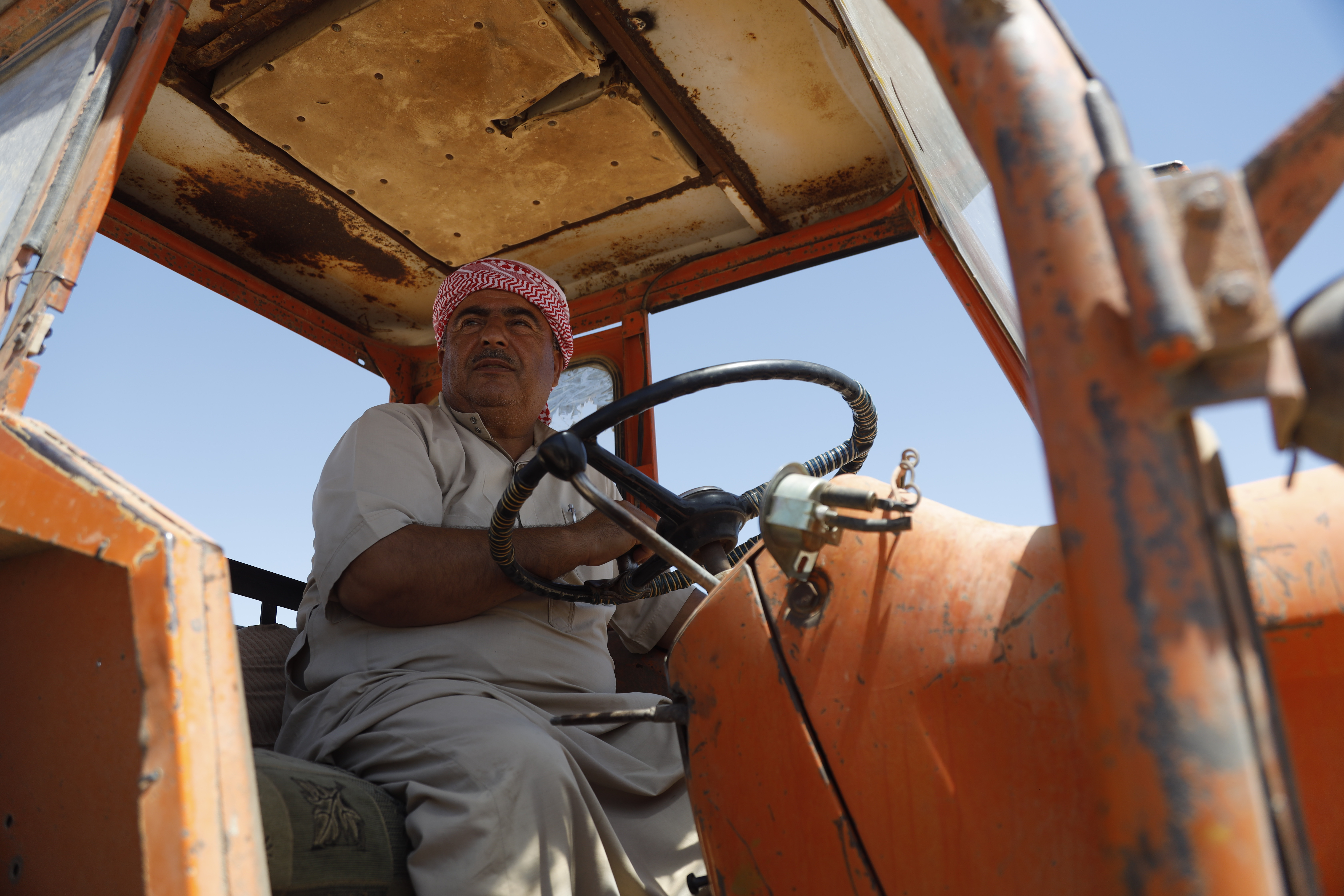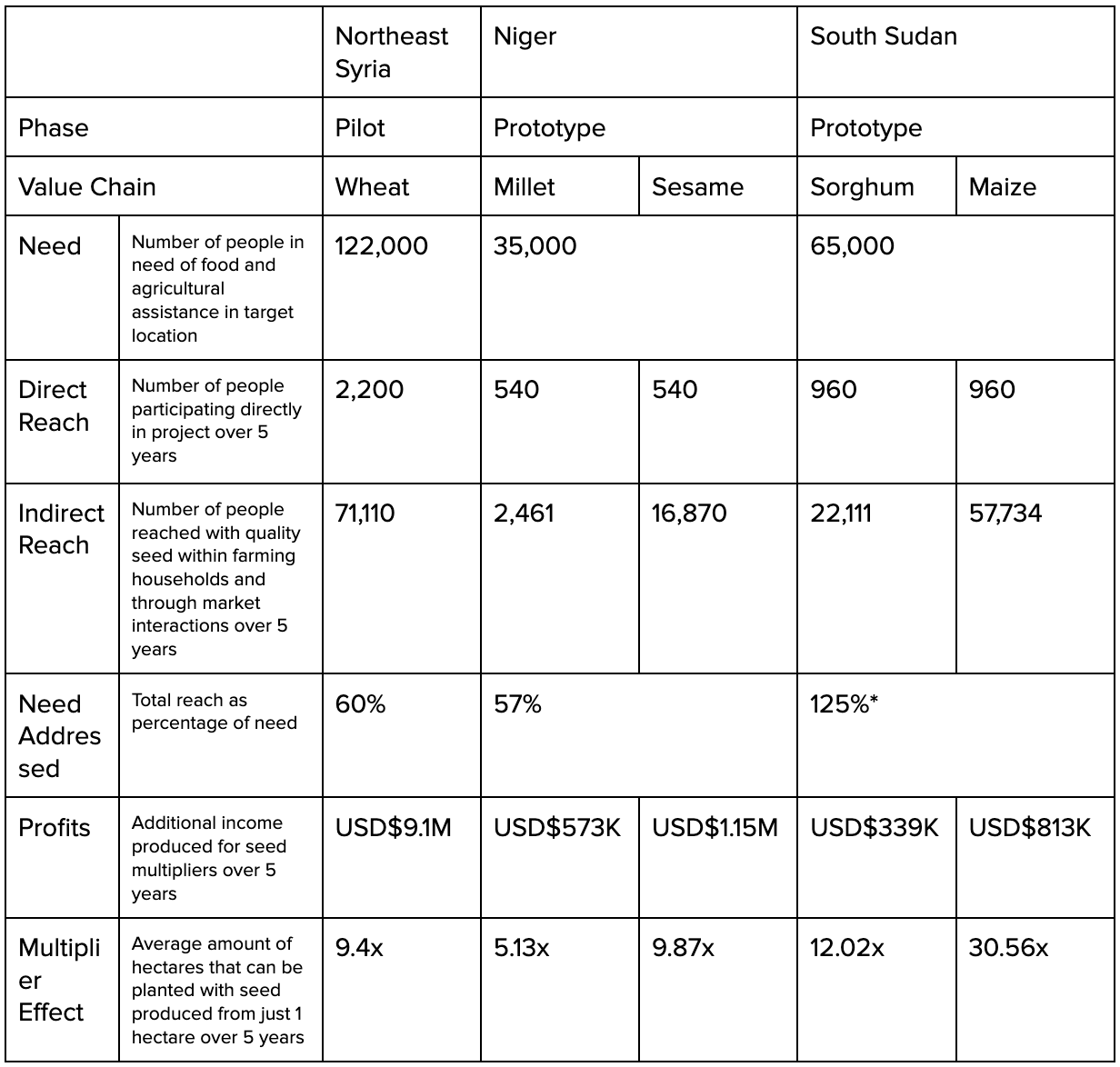
Farmer Seed Stewardship Network
Ensuring farmers in conflict-affected contexts have access to quality climate-adapted seeds.
Farmers need access to sufficient amounts of quality seed varieties to ensure income for their households and food for their communities. However, in fragile and conflict affected contexts, the compounding impacts of climate change, conflict, and poverty have resulted in a severe lack of high-quality and climate-adapted seeds in the market, and farmers face issues in accessing the limited supply that does exist. This means that farms are less productive than is necessary to provide adequate income and food. When farmers plant low quality seeds one season, they produce even lower quality seeds for the next; the situation is getting worse every year.
In partnership with farmers in Niger, northeast Syria, Pakistan, and South Sudan, IRC has generated a solution to disrupt the vicious cycle and support farmers to be stewards of their own economic futures while restoring and maintaining the health of their land. The Farmer Seed Stewardship Network (FSSN) empowers farmers to be citizen scientists so that they can build a more resilient system themselves by:
- Testing existing seed varieties to identify those best adapted to the local climatic conditions;
- Multiplying the identified higher yielding and more climate-resilient seed varieties and donating a portion of the yield to other farmers to expand the network;
- Repeating each season with a growing network of farmers, progressively enhancing the availability of quality seeds and ensuring vulnerable communities can continue farming even when institutions fail.
Our support for this growing farmer network includes a full agricultural input package for each participating farmer, ongoing training and support, and the organization and incentivization of participation through networks, contests, and rewards. Through all these technical support components, we promote the use of climate resilient agricultural practices which enhance both the sustainable use and productivity of farm land.
“If I was ever in doubt, I would ask a question and within one or two hours I would get a response from the expert. I asked my questions, and was able to get a lot of support through the WhatsApp.”
Seed multiplier in pilot year 1 (Syria)
This networked approach fills a gap where conventional seed solutions are insufficient. Current NGO approaches, such as cash for seeds interventions (which provide farmers cash to purchase the inputs they need most in the local market) or trainings in agricultural practices are not enough when the seeds available in the local market are of low quality or are scarce. Further, these approaches do not address the underlying system breakdowns, cannot meet the need, and often promote dependency on aid.
“Two men from my village were surprised to see how healthy my crops were. They came to ask me what I had done differently. I felt very proud to show them my fields.”
Woman seed multiplier in pilot year 1 (Syria)
The FSSN takes a people-first approach; it is rooted in farmers and their communities to promote its acceptability and enhance its resilience to potential political shocks and contextual changes. At the heart of the FSSN is an understanding that farmers know their contexts best and, equipped with knowledge and resources, are best positioned to build a more resilient system.
“Thanks to this project, in the future I will depend only on myself to test the seeds before I grow them on a larger area. I am curious to test the other varieties in the market.”
Seed Tester in pilot year 1 (Syria)
The FSSN was first developed with farming communities in northeast Syria, where the project is now in its third pilot season. In Niger and South Sudan, we are prototyping the FSSN to adapt the model to local contexts. In Pakistan, our recommendations are being incorporated into ongoing seed security programming. While the core tenets of the FSSN remain consistent across all project sites, the solution package is customized in each target location to address the local social, political, economic and climatic conditions, ensuring the approach is both effective and contextually relevant. We have indicated our projected impact across project sites below:

*Reach is calculated in terms of how many farmers can be reached within households and via market interactions with the seed produced through multiplication over 5 years. This project is projected to produce sufficient seed to reach all people in need in target locations and some multiple times.
“Confident from last year, I can advise my neighbors and get even better results this year.”
Seed multiplier in pilot year 2 (Syria)
Looking Ahead
As we test and scale the FSSN across Niger, South Sudan, and Syria, we are also laying the groundwork for further adoption across additional conflict affected contexts. We're developing a comprehensive 'scaling package' that enables IRC country programs and other implementing partners to adapt and expand the FSSN with minimal support from our technical and innovation teams.
We also hope to leverage early successes as proof of the viability of investing in climate resilience in fragile contexts and to therefore advocate across the sector for greater investment in people-first climate resilience solutions where the need is most urgent. Catalytic investments in our innovation process will help the IRC to reach agro-pastoral communities and people that rely on them, supporting them to make critical adjustments at an inflection point when the impact of climate change is straining their resources and limiting their futures. Funding this work will enable us to generate breakthrough solutions for the millions of people who are in need of food and agricultural assistance in fragile contexts globally.

Project Timeline
Design Research in Syria, Pakistan, South Sudan, and Niger
Produced an evidence review and conducted semi-structured interviews and focus group discussions with 270 farmers, agro-dealers and representatives from local NGOs to surface insights into challenges, opportunities, needs, desires, and preferences across each context.
Design Sprint in Northeast Syria
Conducted a series of design workshops with the northeast Syria technical country program team through which we generated the seed testing and multiplication solution idea. We solicited preliminary feedback on these ideas through interviews with eight farmers.
Resource
Related Links
Articles
- Climate-resilient seeds offer farmers in Syria a path to food security | Devex
- Understanding the impact of climate change on remote agricultural communities to design for resilience | by Yanna Vogiazou | The Airbel Impact Lab | Medium
- How Seed Testing Competitions Boosted Seed Quality (Green Nudges)
Resources
- Sustaining and Scaling the Farmer Seed Stewardship Network
- How Community Influencers Can Encourage Climate-Smart Farming in Syria
- Seeds of Trust: What Behavioral Science Teaches Us in Syria
- Climate GRIP Biannual Update (April 2025)
- The next chapter of resilience: Pairing proven solutions with bold innovation at the climate-conflict nexus
- Farmer Seed Stewardship Network (FSSN): A New Approach to Rooting Climate-Resilient Futures in Fragile Contexts Report
- Climate Action for the Epicenter of Crisis: How COP28 Can Address the Injustices Facing Conflict-Affected Countries | International Rescue Committee
- IRC Announces Winner of Global Challenge to Reduce Fossil Fuel Dependency in Syrian Irrigation